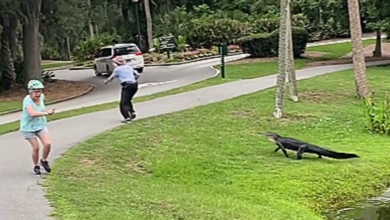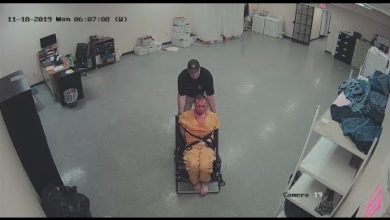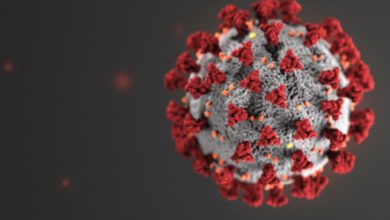
The University of Cincinnati’s Air Force ROTC program had many plans between the spring of 2020 and now for its students (cadets) – assigning jobs and bases to soon-to-be seniors, training soon-to-be juniors over summer break and saying goodbye to the graduating class.
Then the COVID-19 pandemic hit.
That’s when its plans went awry: Everyone’s job and base assignments were delayed, only half of the junior class was trained and some spring 2020 graduates weren’t able to start their jobs.
Because of these setbacks, UC’s Air Force ROTC program has had to adjust, re-adjust and re-re-adjust in order to serve its purpose, which is to train students to become officers in the Air Force and Space Force while they complete their degrees.
COVID-19: Ohio to get 88% fewer Johnson & Johnson vaccines next week
As of this spring semester, the program is composed of 84 cadets. All are required to attend online aerospace studies and leadership laboratory courses, where they learn about the Air Force’s history, how to give briefs, and other related topics. In-person physical training is also mandated, making the minimum weekly contribution to the program a total of five hours for freshmen and sophomores and seven for juniors and seniors. However, this does not take into account the program’s extracurricular activities such as color guard, drill team and service events.
Better safe than sorry
One of Air Force ROTC’s cadets is Trinia Medrano, 23, a fifth-year cadet pursuing her Bachelor of Science in computer engineering and Master of Business Administration through UC’s accelerated engineering degree program (ACCEND). Medrano, who was born in the Philippines but lived in Cincinnati since 2009, is also the detachment’s cadet wing commander, making her responsible for the planning and execution of nearly 100 hours of practical military training this spring semester.
Medrano, a Walnut Hills High School graduate who will soon become a developmental engineer, received her job assignment from the Air Force in mid-January – about eight months after she was originally scheduled to receive it.
“From last spring, it got delayed to October and they said we’ll find out,” Medrano said. “October came and they were like, ‘Oh before Thanksgiving.’ Thanksgiving came, and then they were like, ‘Oh, before the 18th of December.’ That came and then, I think it was three to four weeks ago (mid-January), we finally found out.”

Base assignments have also been delayed, a situation caused in part by the COVID-19 pandemic, according to Capt. George Missinne, the detachment’s operations flight commander. The captain has been in the military for nearly two decades and has spent the last two and a half years teaching in UC’s Air Force ROTC program.
The delays are essentially the result of the domino effect – once one falls the others are sure to follow. The first domino was the stop movement order from the secretary of defense in March 2020, which prevented domestic travel for all department of defense military personnel. Once the order went into effect, people were unable to move from one base to another, bringing a halt to upward movement within the military. This standstill resulted in job and base assignments being temporarily unavailable to the spring 2020 graduates and significantly delayed for the spring 2021 graduates.
'Vax & Vote': With early voting underway in Ohio, one county seeks to increase voter turnout and COVID-19 immunity
The next domino was the temporary closing of officer technical training schools. These facilities shut down to sanitize and modify their training practices in order to adhere to the Centers for Disease Control and Prevention’s COVID-19 safety guidelines.
“Every job has its own training segment typically, so they’re all doing different things,” Missinne said. “Some of them are opening new schoolhouses so they can push forward more people. Some of them are shortening training iteration length so they can have more iterations every year.”

The facilities that host field training, a two-week summer bootcamp designed to test sophomores on what they’ve learned so far in the program, encountered the same delays as the Air Force’s officer technical training schools. Each year during the spring semester, sophomores undergo field training preparation to help them endure the physical fitness assessments, marching and leadership evaluations that take place during field training. The result: Half of this school year’s juniors were unable to go through field training last summer. They are now in field training preparation – for the second time – with this year’s sophomores and will go through field training with them this summer.
“So, there’s been a slight delay, but we’re already seeing that kind of dissipate,” Missinne said. “Over the next year to two years, we’ll just be recovering from that ripple effect.”
Politics: Ohio GOP lawmakers want to protect those refusing COVID-19 shot from discrimination
There is some good news to all of this: righting these fallen dominos can be used as a valuable teaching moment. Missinne often tells cadets that they are getting the chance to see the Air Force complete an oversized group leadership project, which is an activity that the military uses to teach cadets how to utilize teamwork and creative thinking to solve complex issues.
“We have a big ambiguous problem, there’s no distinct solution available right now, so let’s create one,” Missinne said. “I think that’s really cool to use as a leadership experience and a learning experience.”
Camaraderie in quarantine
UC’s Air Force ROTC program has established a partially in person, partially online point-based system to ensure its cadets are physically fit. They each must acquire 1,200 points each week, one-third of which is done at home. The two in-person physical training classes that cadets are required to attend each week are worth 800 points collectively, allowing them to complete the remaining 400 points on their own time.
The main purpose of physical training is to prepare cadets for their physical fitness assessments, a metric that plays a role in determining their jobs, bases and continuation in the program, according to cadet Layne Miller, 20, a junior majoring in international affairs who was born in St. Paul, Minn., but attended high school in Beavercreek, Ohio.
But it’s about more than just getting fit; the training and workouts are what generate a lot of the program’s morale, according to Medrano. This year, some cadets have even began working out together outside of physical training or joined fitness groups on campus to both stay in shape and engage with others.
“(Air Force) ROTC is a face-to-face training program at its core, and it’s centered on team building with significant physical element that’s hard to replicate with COVID-19 restrictions,” Missinne said.
COVID-19: Ohio lifted limits on outdoor events. So when will Taste, Oktoberfest be back?
He has also noticed that the absence of in-person classes is leading to a lack in accountability and motivation from cadets. Many cadets have explained to him that they feel as though they have too much time, so they end up procrastinating.
“There’s something that happens to your morale when you’re just staring at that screen all day every day,” Missinne said. “Our cadets are not immune to that.”
Some cadets have taken to forming study groups in order to combat this issue. Bi-weekly wellness checks are also given by junior and senior cadets to the underclassmen, cadet Shania Lindsey, 18, a freshman from Phenix City, Ala., studying nursing, wrote in an email.
Another cadet, Jaclyn Turk, 19, who is a freshman studying international affairs, believes the Air Force has done an exemplary job at supporting its cadets emotionally during the pandemic.
“I have never had so many people check in on me,” said Turk, who is from Wadsworth, Ohio, a suburb of Akron. “I have never had so much mental health awareness, that healthy environment that’s like, ‘It’s OK to talk about it. We’re here for you.’”
COVID-19 vaccine do's and don'ts: What to keep in mind after the shot in the arm
When asked about financial support, Turk still replied in the affirmative. When she was deciding whether to attend UC or Ohio State University, UC offered her free room and board for her first year on campus – tipping the scales and solidifying her decision to go to there. Cadets are also able to receive free tuition and grants from the program, though it is dependent on what courses they take and when they commit to attending UC, according to the Air Force ROTC website.
One aspect of the Air Force ROTC experience that Medrano is trying to keep intact are the events and field trips that the detachment normally participates in. As of March, their visit to Camp Atterbury in Edinburgh, Ind., has been canceled and their trip to Moody Air Force Base in Georgia has been pushed back until early fall semester.
Despite these changes, Medrano still has four events in the works to keep her cadets engaged. One, called warrior day, is specifically for sophomores (and this year half of the juniors) and will go over field training material such as dorm maintenance, marching and warrior knowledge (chain of command, code of conduct for prisoners of war, mission statements, etc.).
Another event, called Battle 665 (the UC program’s detachment number), will be an in-house competition similar to the show American Ninja Warrior. Medrano has also planned a career day, which will consist of 10-15 officers from various air force bases speaking to cadets through a video platform like Zoom or WebEx.
COVID-19: Plan to get 80% of Cincy region vaccinated by July 4
The program’s final event will be a senior day, essentially a promenade that’s meant to highlight the seniors that have completed the program. This year it will be live-streamed for cadets’ friends and families, a significant improvement from last spring’s graduating class, who, because of the sudden onset of the COVID-19 pandemic, were unable to partake in the tradition.
“It’s usually a part of a bigger event called military ball, which is usually very formal,” Medrano said. “We really want to give our seniors that opportunity, no matter how small it is, this semester.”
Several cadets believe that some portions of the program are suffering from not being in person. For Miller, it’s the cadets and cadre’s involvement and enthusiasm about the program, in addition to the effectiveness of leadership projects in their leadership laboratory course. Turk’s concerns, on the other hand, are directed towards the cadets’ drill and classes.
“It’s hard to gauge where you are academically on an online format,” Turk said. “You don’t really know if you’re doing well or not, there’s nobody asking questions, you’re kind of just getting material thrown at you and do with it what you will.”
What the future holds
There has been no transfer of COVID-19 attributed to the Air Force ROTC program at UC, according to Missinne. The Air Force itself has recorded over 49,000 cases of COVID-19 since it began keeping record of COVID-19 cases, deaths and hospitalizations on its website in March 2020.
“When it comes to ‘How do we have this training and make sure we have things in place to keep our folks safe?’ that’s purely on (Medrano) and her other seniors,” Missinne said. “It’s not us just throwing a bunch of rules down the gauntlet. As officers, we put it on them and we’re like ‘Hey how are you going to get your training mission done and keep everyone safe as a first priority?’ ”
COVID-19: What's a vaccine passport and are they required in Ohio?
Missinne also mentioned that, while it may seem as though they are putting a lot of weight on the senior cadets’ shoulders, these are relatively low stakes compared to what they will be responsible for once they commission in the next few months.
When asked if they feel prepared enough to continue the program and (some sooner than others) become officers in the Air Force, Medrano, Miller, Turk and Lindsey answered favorably.
“(COVID-19) really pushed mentorship from older cadets, and I believe that they really tell us what to expect, what to know moving forward,” Turk said. “We’re not going into anything blind, so I think that they do prepare us pretty well.”
Cadets that graduate from the program will go on to become second lieutenants, overseeing anywhere from 10 to 80 airmen, said Missinne. They may also get the chance to obtain their master’s degrees for free because of the Air Force’s graduate program tuition assistance.
News: NKY leader needs 'break from public health' after 'brutal' pandemic
“Ultimately our motto in Air Force ROTC is that academics come first,” Missinne said. “The Air Force likes lifelong continuing education and want(s) (cadets) to grow.”
But, between then and now, most cadets are yearning for something much simpler than commissioning or continuing their education: “I’m just looking forward to everything returning to normal,” Layne Miller wrote in an email.
Tawney Beans is a senior journalism student at the University of Cincinnati. This article was written for her capstone course.
Source link







